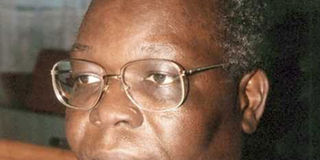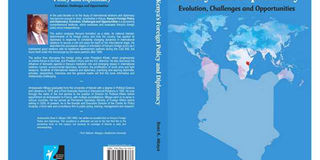Sixty years of Kenya’s dance on world stage

Ambassador Boaz K. Mbaya, author of the book 'Kenya's Foreign Policy and Diplomacy.' PHOTO | COURTESY
What you need to know:
Mbaya’s self-directed efforts to document his experience and perspectives on Kenya’s foreign policy is laudable.
The book is as timely as it is timeless, critical and appealing to diplomatic, academic as well as general readers interested in Kenya’s foreign policy.
It is, therefore, an important addition to existing literature on Kenya’s involvement in the international stage, an incredibly authoritative source of information on the subject with a good balance of academic rigour and practitioner perspectives.
The book by Mr Boaz K. Mbaya titled Kenya’s Foreign Policy and Diplomacy: Evolution, Challenges and Opportunities (2019), published by the East African Educational Publishers, Nairobi, provides a fresh insight into Kenya’s actions on the international stage over the past 60 years. The book is a seminal contribution by a Foreign Service practitioner. It also examines the key dynamics and factors that have shaped key epochs in Kenya’s history from Kenyatta I in 1963 to Kenyatta II in 2019.
LOOK EAST
The book opens with a review of some of pillars of Kenya’s foreign policy since independence. Ambassador Mbaya’s book sums some of the early impasses in Kenya’s foreign policy in the conundrum over aligning to either the West or East during the Cold War. This quandary first played out in the Kenyatta I and Jaramogi Oginga Odinga’s alignment to the West and East respectively.
Whereas present day pundits suggest that the Look East Policy is a creation of the Kibaki administration perfected by Kenyatta II, Mbaya says the policy was at the core of the Jomo Kenyatta-Jaramogi Oginga Odinga political tussle, which led to the ejection of the latter from the Kenyatta's I administration. While Jaramogi was perceived to have embraced the East, especially Russia (then Soviet Union), the Kenyatta I administration was aligned to the Western bloc (or behaving as being non-aligned). Ironically Odinga II and Kenyatta II have been diametrically opposed in their foreign policy orientation, with Odinga posturing as a darling of the West while Kenyatta II was courted by the Chinese and other former Cold War Eastern bloc interests such as Russia.
Mbaya’s book also explores the influence of domestic politics on foreign policy. One such instance is the election of Uhuru-Ruto in the 2013 elections under a cloud of serious International Criminal Court Indictments. A uniquely Kenyan internal occurrence, the post-election violence over the disputed Odinga-Kibaki electoral contest of 2007, metamorphised into an important (perhaps the only) pre-occupation of Uhuru-Ruto’s first term (2013-2017). The trial at the ICC in The Hague intermeshed domestic politics and foreign policy with the then Foreign Minister, Amina Mohammed, engaged in incessant shuttle diplomacy trying to establish an AU coalition to scuttle and defeat the ICC indictments and the trial.

Mbaya’s book concludes that Kenyatta II’s foreign policy legacy will be defined by the dichotomy of his success in obviating the ICC indictment against him and his deputy and attempts to repair his and the country’s image, and the miserable failure to deal with ethnicity, corruption, the odious national debt and governance challenges. The existing debt burden is unsustainable and would constitute a trigger for future social and political implosion, especially with an economy in the doldrums and a youth bulge feeling left out of the mainstream. Interestingly, Kenyatta II’s campaign as well as his high-profile international engagements had a major youth agenda.
Mobilisation of ethnic emotions for political gain, partly to blame for the post-election imbroglio of 2007/08, goes on unabated. All these, in addition to the opacity of the electoral system and especially the electoral management body, work to undermine the very stability and survival of the country and the basic tenets of the government’s 2014 Foreign Policy Framework. Whereas the country has embraced the projection of national interests as a foundational precept, the same is not reflected in the domestic and foreign policy approaches.
In addition, the book also examines foreign policy making and implementation processes. The chapters that form this section of the book are of interest to Kenyan diplomats, accredited foreign diplomats, academics and students of foreign policy. The broad spectrum of issues that fall within the gamut of diplomacy and foreign policy are also elucidated in the various chapters of the book. These range from national security, conflict and conflict resolution, regional integration and environment. The intervening sections of the book present a rich synthesis of Kenya’s foreign policy under different regimes starting from the Kenyatta I, Moi, Kibaki and Kenyatta II.
TOP DIPLOMATS
It is an enormous task to capture 60 years of diplomacy and foreign engagement covering four presidents in one book, but Mbaya’s pivotal book constitutes a foundational discourse on which other actors in Kenya’s foreign policy establishment can expound.
It is an important structured study of Kenya’s ‘dance’ on the world stage. The publication should, therefore, challenge Kenya's other top diplomats, past and present, like Moses Wetang'ula, Raphael Tuju, Amina Mohamed and Kalonzo Musyoka to pen down their experiences on a number of critical issues that Mbaya’s book espouses.
This publication is for me a revisitation of the role of the ministry of Foreign Affairs’ Foreign Service Institute in regards to tapping the rich repertoire of insights and knowledge of retired Foreign Service officers that would inform and reinvigorate the 2014 Foreign Policy framework. Mbaya’s self-directed efforts to document his experience and perspectives on Kenya’s foreign policy is therefore laudable.
The book is as timely as it is timeless, critical and appealing to diplomatic, academic as well as general readers interested in Kenya’s foreign policy. It is, therefore, an important addition to existing literature on Kenya’s involvement in the international stage, an incredibly authoritative source of information on the subject with a good balance of academic rigour and practitioner perspectives.
Atunga is trained in diplomacy, international relations and national security and is working on his PhD candidature in Perth, Western Australia. contact: [email protected]




